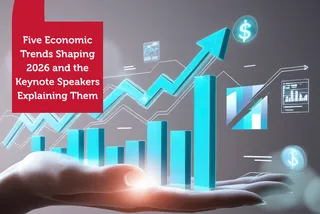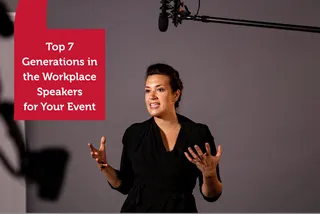Refine Search
Blog
Collaboration and cooperation are essential for any team. Teamwork is important because it enables your operations to run smoothly, and makes everyone within the team feel valued and useful in their role.
Total results: 1172
Blog
Olga Nitschke In 2026, trade policy uncertainty, AI productivity paradoxes, labour market cooling, regional economic divergence, and energy transition investment are reshaping business strategy. At Speakers Corner, we match organisations with economists and policy experts who translate these trends into actionable insights.
Blog
Olga Nitschke Technology trends shape corporate agendas in 2026, with AI, digital transformation, and cybersecurity topping event organiser requests. Finding speakers who translate complexity into actionable insight requires careful curation and a genuine understanding of your event's purpose. Here is how we do it.
Blog
Olga Nitschke The modern workplace has never been more complex or more diverse. In 2026, organisations are bringing together four, sometimes five, generations at work, each shaped by different economic realities, technologies, and expectations.
Blog
Collaboration and cooperation are essential for any team. Teamwork is important because it enables your operations to run smoothly, and makes everyone within the team feel valued and useful in their role.
Blog
Technology is rapidly transforming various sectors, with the potential to significantly change the way we live and do business in the next 20 years, marking a period of unprecedented change.
Blog
Javier Bajer gives us an insight into how to change our thinking to overcome our barriers to changing behaviours. Read on to see Javier's insight into altering our behaviours.
Blog
To celebrate International Women’s Day we are bringing you a list of 9 powerful female entrepreneurs and their stories of how they created astounding success from scratch. Not afraid to make bold changes, our 9 entrepreneurs will inspire you all to make your dreams a reality.
Blog
An awards ceremony is the perfect event to celebrate the successes, talent and achievements of your team. Whether you’re hoping to simply appreciate employees or acknowledge the successes that were reached from hard work, an awards ceremony can certainly help you achieve all the above.
Blog
Although commonly grouped together and often confused with one another, Global Warming and Climate Change are actually two different things.
Blog
Adversity presents itself in a multitude of ways and affects individuals in many different forms. Everyone deals with adversity differently, with some viewing it as a catapult into a new way of life that inspires others, whilst others will struggle to cope with the new challenges they face.
Event Tips
Whether you’re a first-time planner doing this in your spare time, or a seasoned professional in need of a refresher, we've put together a guide to help you master the dark arts of event planning.
Event Tips
A comedian is a wonderful edition to an event and we have put our heads together to come up with some top tips on how to hire a comedian for your event!
Copyright Speakers Corner 2026
| Agile Development by Byte9




